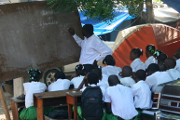
Haiti (MNN) — Election watchdogs say Haiti's elections were
valid. In that vein, the ruling party
acknowledged a possible defeat. Their
admission raised hopes for an undisputed power transfer, although there were
concerns that mobs of people, dissatisfied with results, could erupt into
protest.
Early results are expected by December 7, but it could be as
late as December 20 before the final results are announced. That means that the Caribbean nation, with a
notorious reputation for violence, could
be looking at a long political limbo. If
no presidential candidate wins a majority of votes, a run-off election will be
scheduled for January 16.
Life will go on while the ballots are counted. Steve Geurink with Worldwide Christian School
says, "Obviously, it affects education,;it affects teachers and families. One of the last things that Haiti needs is any question about an
election at this time."
WWCS partner, CRECH (Consortium for the Reinforcement of
Christian Education in Haiti), goes forward with plans to move from "Destruction
to Restoration" of the Christ-centered Schools.
WWCS is working with an association of 231 Christ-centered
schools in Haiti, administrated and run by Haitians themselves. Most of
these schools, 200 in all, were damaged or destroyed in the
earthquake. Unrest, heavy rains, a
cholera epidemic, and political rioting have played a role in slowing down
recovery efforts, and we asked Geurink if the election limbo will cause further
delays.
Their team knows the region and its challenges. Geurink
responded, "I would say that we're prepared for disruptions, but I think that
the schools and programs that we're working with probably will not be affected
by an election outcome. We're going to be working in some of these remote areas. Simply eking out an existence is the
issue at hand for them."
More than anything, the chaos revealed another need. "We
need an educated populace. We need the people of Haiti to be confident in their
government, and that all happens through education. Our bonus is that we're
focusing on Christian education."
The nuts and bolts of the recovery projects will be managed
locally, Geurink explains. "We refer to it as
‘tear it down to build it back up.' There are schools and many buildings that are unsafe. We have to tear those down.
We want to employ Haitians to do this. They will also be involved in the
rebuilding of these schools."
However, rebuilding 200 schools is a big project that can
only be managed in bite-sized pieces. "Right now our target is those five," says Geurink. "As
soon as we start seeing success, we'll start adding new schools to the list. We
expect to do this for three to possibly five or seven years."
Equipped with the people and tools to do the job, WWCS and
its Haitian partners will be a force for positive change in Haiti, offering a
fresh start for Christ-centered schools as they offer education from a biblical perspective to the people of this
resilient nation. Click here to
help.

